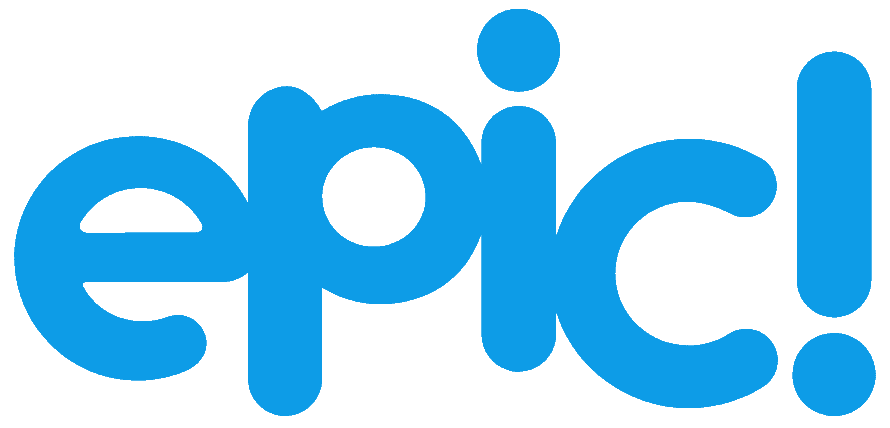Epic!
 ™
™
Chapter License: CC-BY
Developer: Epic! Creations, Inc.
Price: Free to elementary school teachers and librarians in Canada and the U.S.; subscription options available
Summary: A digital library and reading platform for children 12 and under
Overview
Epic was founded in 2013 based on one question How do we make books more accessible to kids? (Epic, n.d). This tech tool was founded by Suren Marosian the CEO and Co-Founder along with Kevin Donahue as the other co-founder. To this date, Epic is used in 94% of U.S elementary schools (Epic, n.d). These two men wanted to take their children’s love for technology and lack of interest in books and combine them so that children everywhere had access to the books they know and love using the devices they have access to. Their goal was successful, Epic has provided a database with over 40,000 books for children twelve and under.
Classrooms everywhere are evolving, and technology has no small part in that. With children being connected more than ever to technology, it is making an impact on their daily lives and daily learning. This is supported by one research study which states that “it is evident that children are spending more time online, and at earlier ages (OECD, 2019). There are many ways that educators can use technology tools to their advantage. In many kindergarten rooms, you will see technology as part of the learning centers, and in older grades you will see it used for research or reading. One specific tool that is currently already in use in some classrooms, Epic will be examined as a technology tool.
Critique and Implications for Education
Benefits
Epic can be used both at home and in classrooms. This tech tool can also be used both offline and online, on web browsers or through the Epic app. Technology devices are becoming increasingly important in today’s classroom for learning purposes; “new technology and devices like tablets, smart phones, or online-communities in social networks respond to new ways of acquiring knowledge (Sri & Krishna, 2014). Users can search for books based on different criteria including subject, genre, age or reading levels. If students are stuck on a word, they can simply click on it to which it will then read the word and provide a definition for the student. Educators also have the option of assigning specific books to their students based on their school board’s reading program, such as Fountas and Pinnell. For educators who are using Google Classroom, you can upload your class list directly to Epic. Students can choose from audio books, read-to-me books or read books themselves which is a great way to reach readers of all levels. When students’ complete books, they can opt for a quiz which would allow the educator to check for comprehension. Additionally, when students’ complete books they can earn badges and rewards based on certain milestones. For educators who are teaching virtually this year, this tech tool is helpful for guided reading in terms of virtual education where teachers do not have access to classroom levelled books.
Challenges
While Epic allows users to try the product with a free trial, you are not able to explore the app without committing to an automatic renewal process that would follow the free month trial. That being said, educators are able to set their class up with free accounts, so if a child is enrolled in school then chances are, they may get a free account. Another limitation is that to use Epic effectively, children should be reading books that are appropriate for their reading levels. Parents and guardians may not know how to decipher their child’s reading level if they are using it outside of school.
Epic may not be suitable for all learners. The truth of the matter is some individuals prefer having a physical book in their hands to read. In one international study regarding families and technology the researchers found that kids love to read and often prefer print over electronic books (Kleeman, 2016). In this case, Epic may not be useful to some students. With many students in virtual learning, some parents or guardians may also prefer that students take a break from screen time and read a physical book. In another study from 2012, it shows that children were reading more on electronic devices than in print form (Picton, 2014).
Access and Cost
Epic is free to elementary school teachers and school librarians across the U.S. and Canada. This is a selling feature to many educators and allows them to incorporate it into their daily lessons for students. Epic also offers a one-month free trial of unlimited access to their library of books. After the free trial ends, there are two purchasing options, a monthly plan which costs $9.99 USD per month or the annual plan which costs $71.99 USD (Epic, n.d).
About the Author

Allison Lennox
Allison Lennox is an occasional teacher with the Durham District School Board. Education is her passion. She believes in lifelong learning for her students and herself. She has 7 years experience within the school board in two different roles: an Early Childhood Educator and an Occasional Teacher. While her passion began with the early years Allison has worked with students of many ages over the years. Allison is currently a student herself while completing her Master of Education with Ontario Tech University.
Allison enjoys visiting new schools to experience the varying needs of students while also learning from her colleagues. It is her goal to receive a permanent role with the school board in either a primary or junior level role. She enjoys reading, travelling, cooking and spending her time with family and friends.
References
Inspiring the Next Generation to Develop a Love of Reading and Learning. Epic! Retrieved November 1, 2020, from https://www.getepic.com/about
Kleeman, D. (2016). Books and Reading are Powerful with Kids, but Content Discovery is Challenging. Publishing Research Quarterly, 32(1), 38–43. https://doi.org/10.1007/s12109-015-9442-3
Picton, I. (2014). The Impact of eBooks on the Reading Motivation and Reading Skills of Children and Young People: A Rapid Literature Review. National Literacy Trust.
Sri, K. U., & Krishna, V. (2014). E-Learning: Technological Development in Teaching for school kids. International Journal of Computer Science and Information Technologies, 5(5), 6124-6126.
What Do We Know About Children and Technology? (2019). Organisation for Economic Cooperation and Development. Retrieved October 21, 2020, from https://www.oecd.org/education/ceri/Booklet-21st-century-children.pdf

